This immune-support herbal tea blend is the perfect natural recipe to have on hand during cold and flu season. It’s a simple herbal tea blend featuring herbs that support immune health, including elderberry and rose hips. This recipe is so easy to make, delicious, and perfect for the fall and winter!
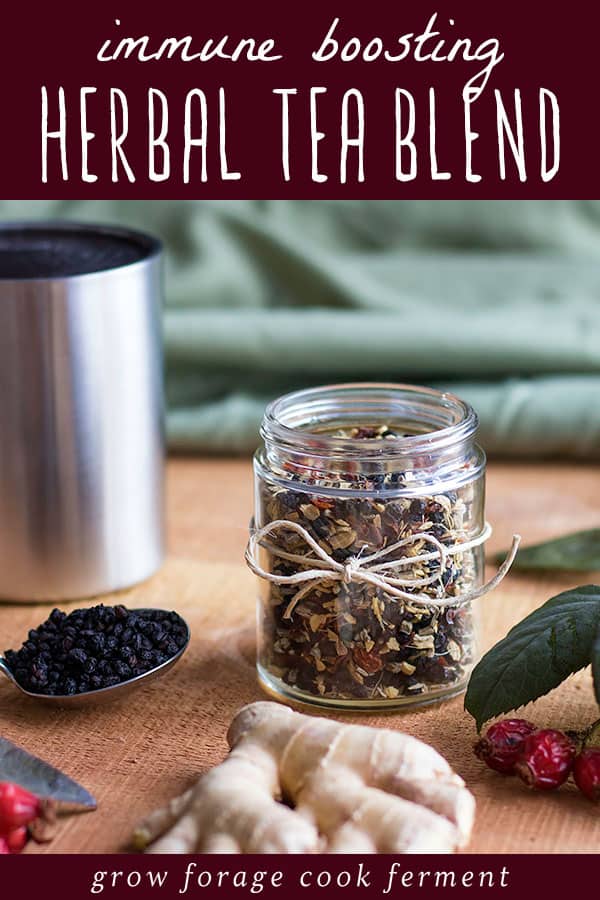
Want to save this post for later?
Herbal Tea for Immune Support
Fall and winter often bring an increase in viruses, although they can occur at any time of year. Fortunately, several excellent herbal allies can support our overall immune health.
When you feel a sickness coming on, sometimes a hot cup of tea is the only thing that sounds good. Choose this immune support tea to help your body stay healthy and get better quickly – the herbalist way!
This immune-support herbal tea recipe is adapted from my book, Healing Herbal Infusions. It’s a great book to have on hand for all kinds of herbal remedies!
Herbs to Include
While many herbs are beneficial for overall immune health, I will focus on five of my favorites here.
When you combine these five herbs, you create a powerful yet still delicious immune-supporting herbal tea blend. Pour yourself a cup!
I like to use dried herbs in this tea blend so that I can prepare a larger batch to always have on hand when needed.
Mountain Rose Herbs is a great place to purchase all five of these herbs!
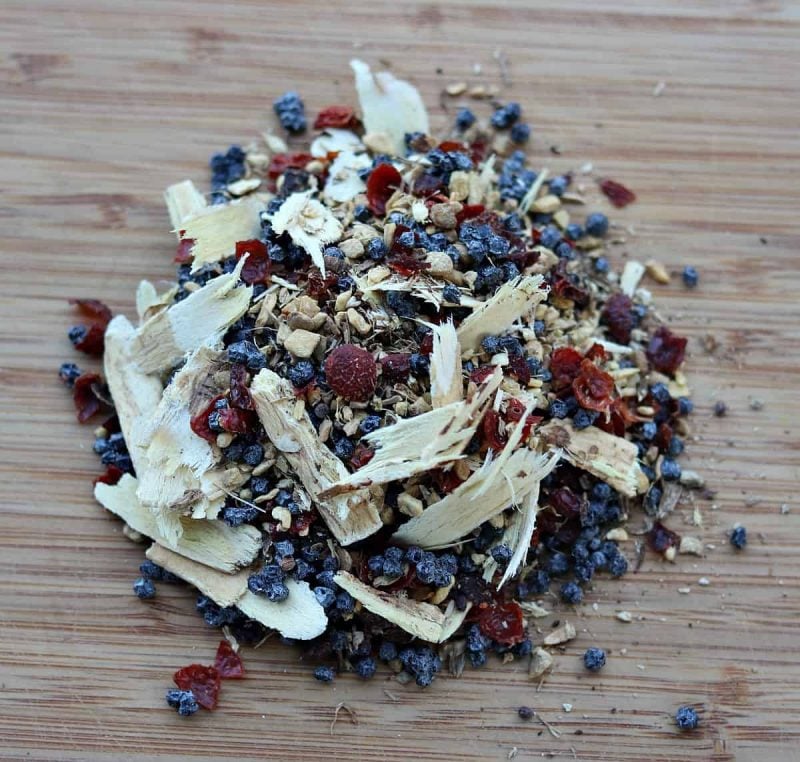
Elderberry
I love elderberries for many different reasons. First, they are super fun to forage for, and I love making elderberry mead.
Studies have shown that elderberries have a significant effect on reducing the duration of colds and their associated symptoms. Elderberry syrup is one of the most popular ways to use them.
Elderberries contain polyphenols and lectins, which have been shown to give them the ability to inhibit coronaviruses. Although further studies are needed, the antiviral properties of elderberries have also been linked to reducing the duration of influenza.
Related: 70+ Elderberry Recipes & Remedies for Food & Health
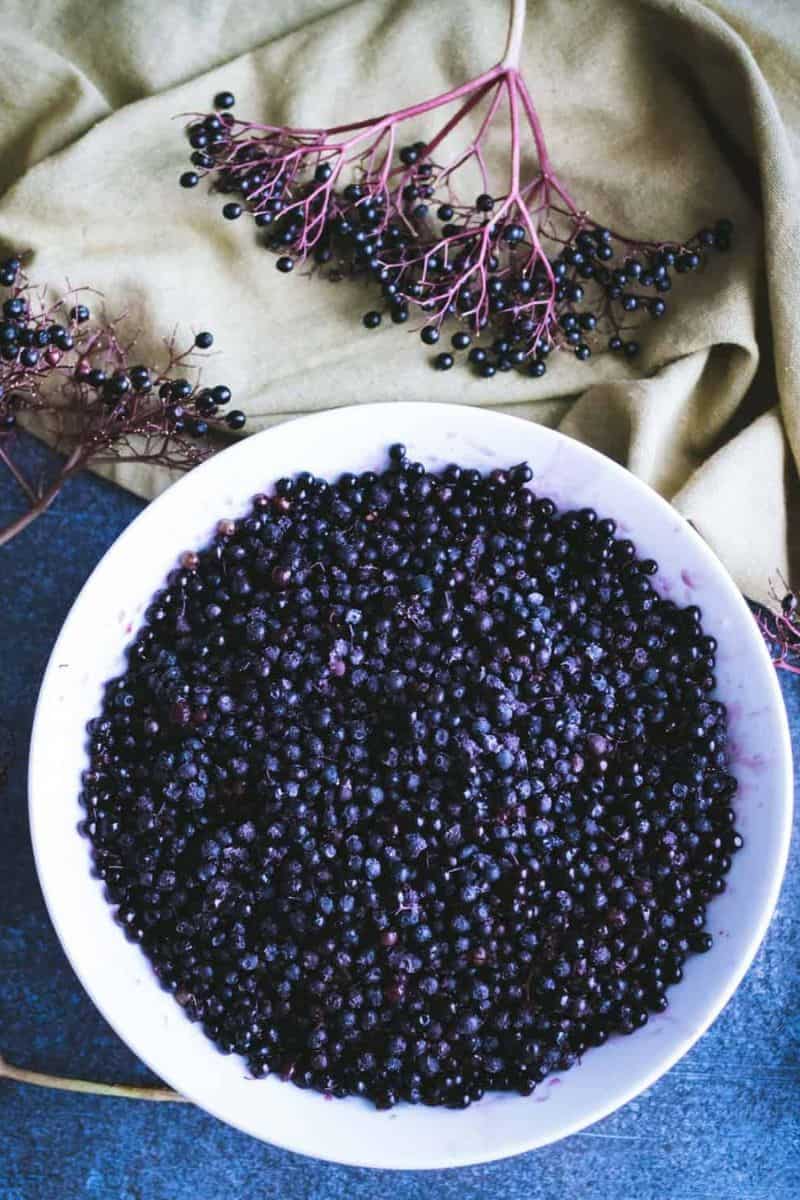
Rose Hips
Rose hips are another herb that has multiple uses, and also give the tea a nice flavor.
They can usually be foraged from fall to winter and can be made into a lovely rose hip syrup for traditional herbal use or culinary delights. It can also be used in cocktails like this rose hip whiskey smash!
Rose hips are known to contain high levels of polyphenols, vitamins C, E, and B, as well as carotenoids, which have antioxidant properties.
Current research has shown that rose hips have a promising future as a functional food, given their potential therapeutic role in combating a wide variety of diseases and their ability to enhance the quality of life for healthy individuals.
Related: 60+ Rose Hip Recipes for Food, Health & Beauty
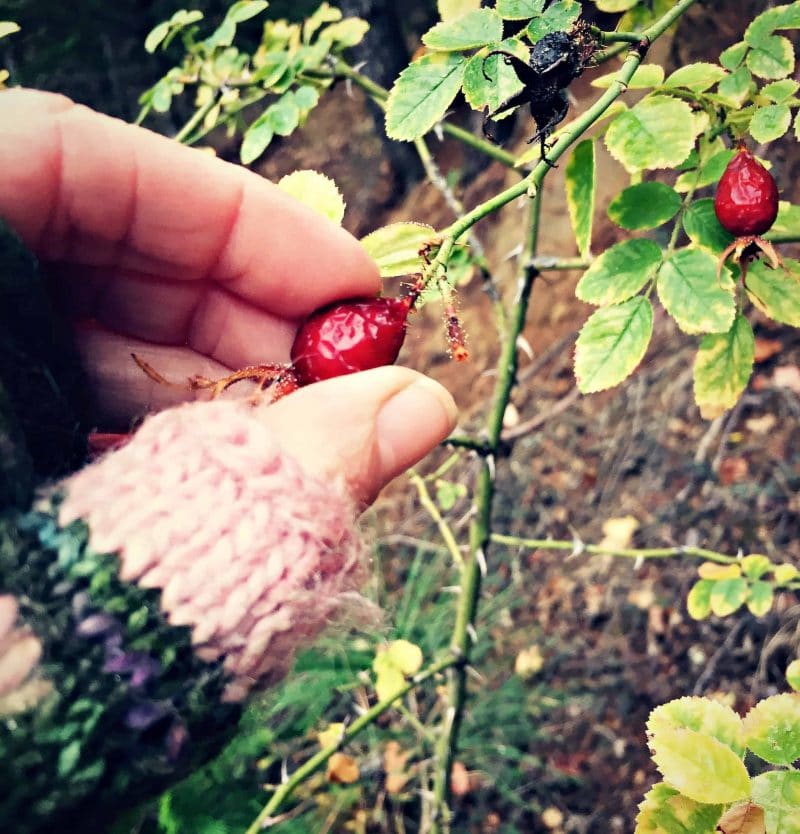
Echinacea Root
You have probably already heard about the immune-supporting benefits of echinacea root, and it’s definitely not one that you want to ignore!
In traditional herbalism practice, echinacea is considered an “alternative herb,” meaning it can help support or facilitate a person’s path to health. In modern herbalism, echinacea is used to help combat viral infections and may help alleviate associated symptoms.
Echinacea root makes a powerful tincture, but is also good in a tea. It does have a bit of a bitter taste, but it works well when combined with other, better tasting herbs.
Astragalus
Astragalus root is a powerful herb used by herbalists to help support a healthy immune system over time. It can be taken for extended periods if necessary, but be sure to check with your physician or herbalist before long-term use.
Although larger studies are needed, a current review of small-scale studies has found that astragalus enhances immune responses and reduces levels of proinflammatory cytokines.
In traditional herbalism practice, astragalus root is also often combined with echinacea for short-term immune support.
Astragalus is an adaptogen that is high in anti-oxidants, and a great herb to always have on hand.
Ginger
I drink ginger in my tea every morning! I love the spicy bite that it gives, and I believe it is part of why I rarely get sick.
Ginger can be made into a healing herbal support syrup or fermented as a ginger bug to make tasty ginger ale or ginger beer.
Ginger is widely studied for its immune-supporting properties. It has demonstrated anti-inflammatory and anti-nausea effects, with research supporting its role in promoting digestive health and alleviating nausea. It may also help ease mild respiratory congestion and support circulation.
Research suggests that ginger may help with nausea and digestive discomfort.
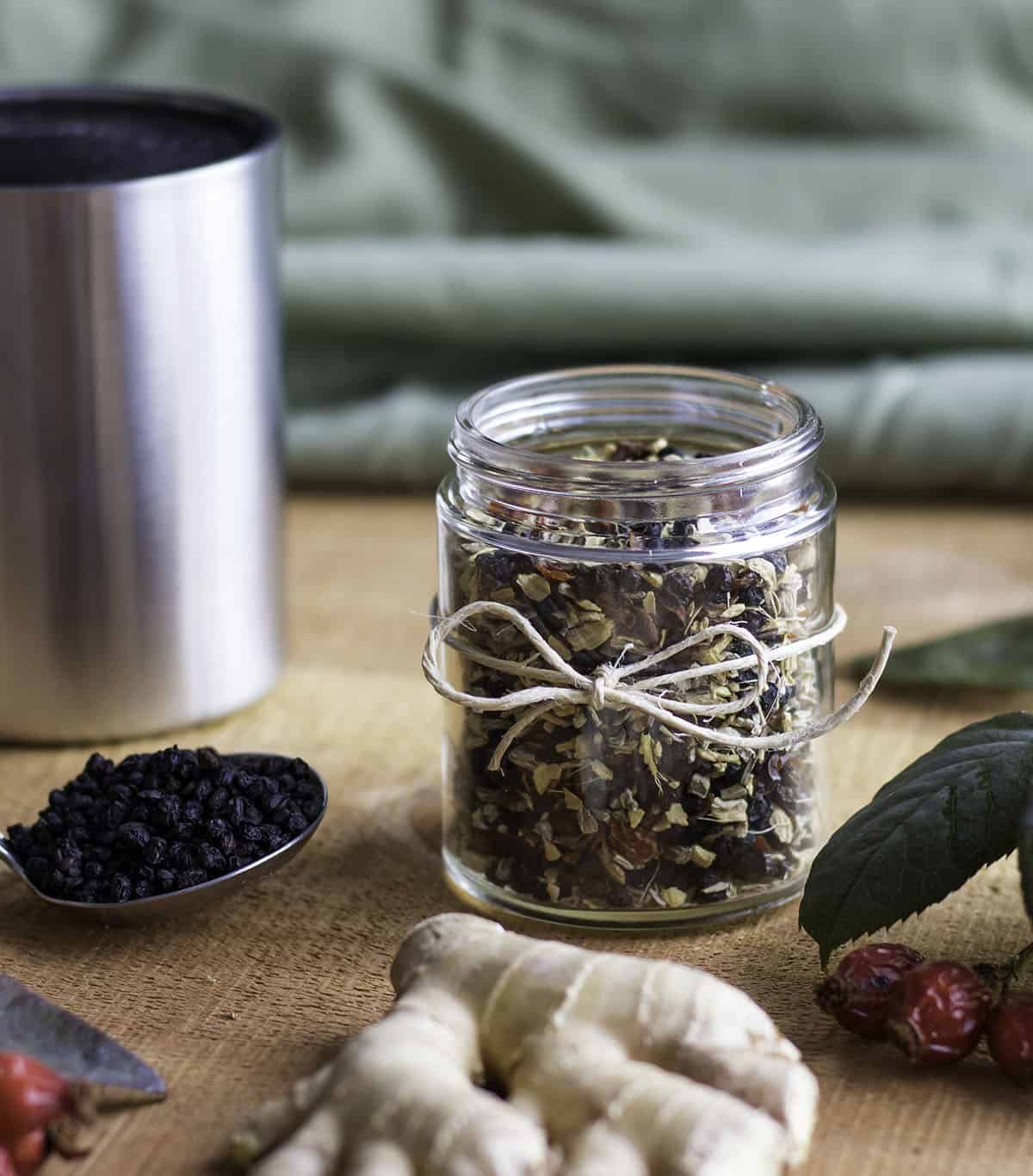
Immune Support Herbal Tea Blend Recipe
Making this herbal tea blend is easy. I generally do approximately equal parts of each dried herb, and I keep some in a little jar so that I always have some on hand.
If you’d like to use fresh ginger instead of dried, you can always leave that out of the blend until you are ready to make the tea, then add the fresh root.
To make the tea, bring 1-2 tablespoons of the tea blend mixture per cup of water to a boil, then simmer for 15-30 minutes or more. The longer you simmer, the stronger the tea will be!
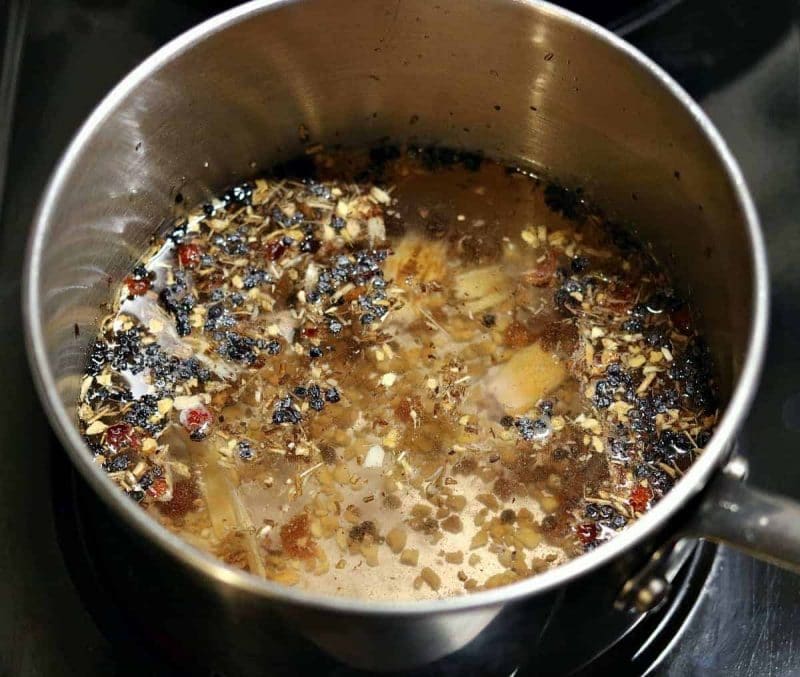
Drink 1-3 times per day when you first start to feel symptoms of a virus. Or if you’ll be someplace where you will be exposed to viruses, such as on a long plane ride. Continue taking for up to 2 weeks if needed.
The best part about this immune-supporting herbal tea blend is that it actually tastes good!
The combination of the elderberries, rose hips, and ginger give it a nice berry flavor with a sweet and spicy kick from the ginger. It’s a treat to drink when the winter sickies come on!
This tea also makes a great gift! Put this beautiful tea blend in a mason jar with some ribbon or twine wrapped around it and a tag with instructions for use.
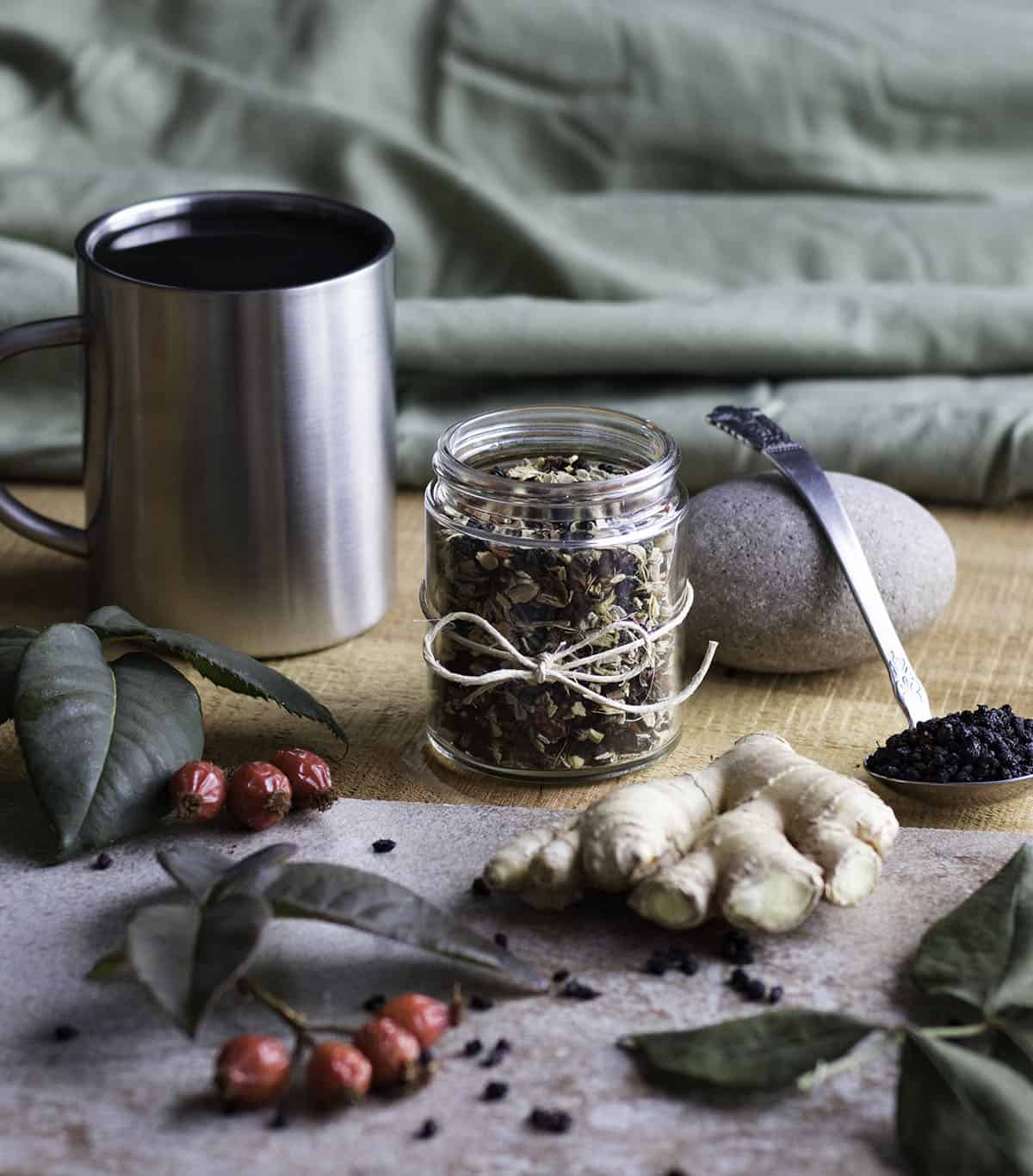
Herbal Recipes for Wellness
Kick your cold to the curb with these other herbal recipes!
- Pine Needle Cough Syrup
- Elderberry Syrup
- Rose Hip Syrup
- Conifer Needle Tea
- Elderberry Echinacea Tincture
Immune Support Herbal Tea
Equipment
Ingredients
- 4 tbsp dried elderberries
- 4 tbsp dried rose hips
- 4 tbsp echinacea root
- 4 tbsp astragalus
- 4 tbsp dried ginger
Instructions
- Combine all herbs in a small jar. Stir until evenly distributed.
- Combine 1-2 tbsp herbal tea blend per 1-cup water in a small pot. Simmer 15-30 minutes. Strain and enjoy hot!
Notes
- This tea recipe easily scales up or down. Combine equal parts of each herb in any quantity you choose.
- To use fresh ginger instead of dried, leave the ginger out of the blend and add the fresh root when you prepare the tea.
- This tea also makes a great gift! Put this beautiful tea blend in a mason jar with some ribbon or twine wrapped around it and a tag with instructions for use.
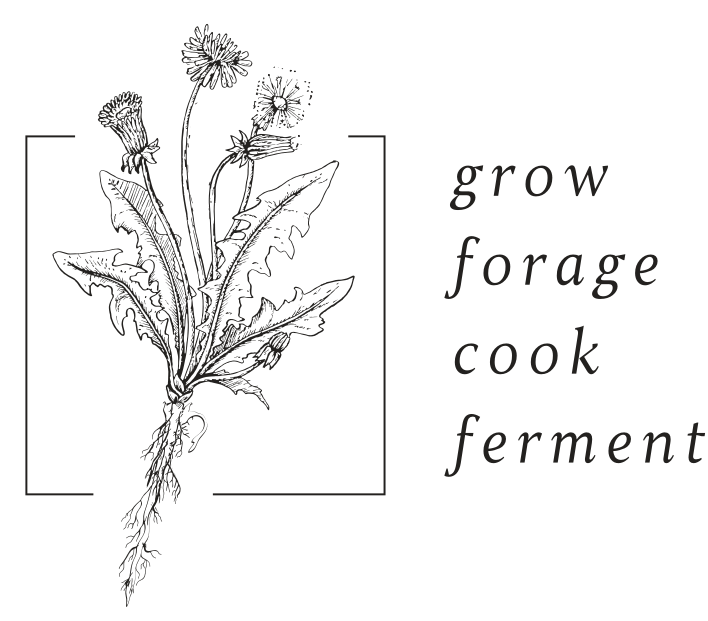
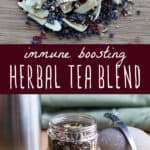
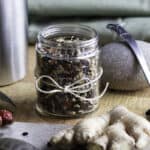

Could i use frozen elderberries and frozen rose hips?
Yes, that should work fine!
What would you recommend to create a tea blend with Chaparral herbs?
I don’t live where chaparral herbs grow, so I can’t really say.
Hello, is it ok not to boil the elderberries in the tea? I make elderberry syrup and I have read you are to simmer them for like 50 minutes. I would love to try this but just wondered about the elderberries possibly being toxic if not simmered long enough? Thank you for your input.
I have fresh elderberries- how do you recommend drying them? I have a dehydrator with adjustable temp.
Hi Kerry. Yes, you can use your dehydrator to dry your elderberries. This blog post looks like it has great instructions.
Do you use ginger root or ground ginger
It’s dried ginger, not ground into a powder.
Love immune boosting herbal teas, and this one looks delicious! Great recipe. ????
You said you “generally do approximately equal parts of each dried herb” – is that by weight or volume?
Is this safe for children too?
Hi Coleen , just a question, i make macadamia nutshell exfoliating powder, i am in need of some help, can you put me on the right track , on how i can & what i need to use as a carrier for showering to exfoliate,
I need youre help here thanks peter.
Thankyou for this informative blog. I too make a tea similar to this normally when I already am unwell, but this has inspired me to make your recipe and have it made up to drink it more often to boost my immunity. My recipe doesn’t have actual quantities, I just throw in some of each: Dried echinacea root, elderflowers & elderberries (dried), chopped frozen rosehips or dried (the frozen are better apparently than dried, as the drying process can destro some of the Vitamin C. Echinacea root, Lungwort and Mullein (as I have asthma). It always gives me a boost. (I will also throw in some Nettle at times). I havn’t tried ASTRAGALUS, I will have to see if I can get this one in New Zealand.
Thanks once again – Linda :)
Good information, Colleen! I need to work on gathering!